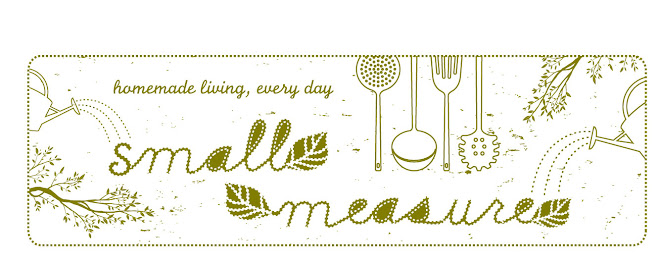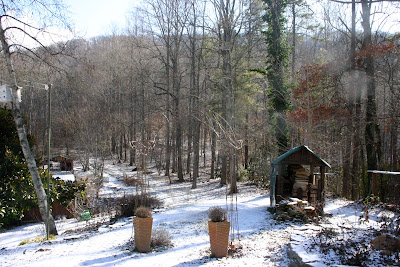Oh. Wow. It's cold here. Very, very cold. Low-temperature-with-the-wind-chill cold. The sort of cold that allows me to not have to go in for jury duty on account of icy roads. Snuggle up next to the wood stove cold.
While we can pile on layers and fire up the tea kettle, the chickens, meanwhile, can't do much more than squawk in complaint and fluff up their feathers in protest. You, however, can be a dear friend and offer up a great deal of aid to them. I'm reprinting below a post I presented last December on this very topic. It's full of easy, beneficial tips for giving your fine feathered friends a bit of cold comfort over these next few months:
The recent spate of abnormally cold weather didn't just make your fingers and toes frosty, it undoubtedly ruffled the feathers of your flock too. Most breeds do just fine in wintery conditions (bantams might need a bit more t.l.c., given their diminutive size), permitted you've bolstered up their environs. I've listed below some low-fi suggestions for warming your flock when Old Man Winter comes knocking.
Feed:
-Now's the time to offer your flock scratch grain or straight corn. The fattiness of the scratch will allow the birds to pack on an extra layer of body fat, which aids them in better combating colder weather. The scratch or corn should be offered as a treat, though, not as the sole source of their diet. Continue them on their feed, tossing a few handfuls of scratch during evening rounds.
Water:
-Yes, most waterers will freeze. If you're fortunate enough to have electricity in your hen house, then by all means purchase an electric waterer warming base (to be used with double-walled, metal waterers). If, however, like me, your coop isn't electrified, you'll need to stay on top of supplying your flock with fresh water. One idea is to fill the waterer with hot water and then drop a chunk of ice or a good amount of ice cubes into the water to slowly cool it down over the course of several hours. If you work away from home, see if a neighbor might be able to check on your flock's water during the day. While they will drink less during colder weather, the birds still need to be able to drink water, period.
Insulation:
-Your coop needs to be fortified against the ravages of cold winds (not to mention chilly predators on the prowl for a cozy bed and a 'hot meal'). While chickens are pretty tough, being able to survive any number of challenges, they are particularly susceptible to wetness and wind. Insulate your coop with spray foam insulation and weather-stripping to keep wind and moisture out and dryness in. Remember that in the warmer months, though, your coop will need proper ventilation to allow dampness inside the coop to leave. We have a ventilation window in our coop for this very purpose, located up near the ceiling and covered with thick-gauge metal screening to keep our predators.
Outdoor perches & roosts:
-You'll want to keep your flock off the ground if necessary. Too much repeated contact with snow and ice can damage their feet, as well as chill them. Consider positioning an extra perch or roost outdoors so that your birds can both get out of the direct cold and have some exercise in the process.
Heavy bedding:
-If, like me, you use the heavy bedding method for collecting coop droppings, now is the time to add an extra heavy layer. Placed over existing droppings, heat will be generated from the composting manure, as well as the birds own body heat at night. It might only be an incremental climb in heat, but, well, all heat is welcome heat when it's freezing outside!
Combs & Wattles:
-A series of days with below freezing temperatures could result in damaging, painful frostbite on your bird's combs and wattles. My gauge is 4 days-if the weather is super cold for over 4 days, I'll rub some balm on my birds tender bits. I use Un-Petroleum jelly, as I like using natural plant oils on my flock.
A Clear Path:
-You don't want an intrepid flock mate deciding to brave a wall of snow. The snow will win, every time. Instead, if you've got over 3-inches of the white stuff, use a flat shovel to clear your birds a path. That way they'll steer clear of any potential damage to their feet as well as have continued areas to roam and exercise.
Gather Eggs:
-If you don't already gather up your flock's eggs on a daily basis, now is the time to begin doing so (and it's really best to already have this as an established habit, as doing so discourages egg-eating). Eggs left out in freezing and below-freezing temperatures can freeze and crack.
So, an ounce of wintertime prevention for your feathered friends is worth a dozen eggs, I always say. Put on your snow boots, slide on your mittens, and get your coop ready for the dip in mercury ahead.













12 comments:
Can you post pictures of your flock and coop? I'd love to see your crew and their quarters.
tami-if you click on the link from where i say this is a repost from last december and then scroll to the bottom, you can see images on of the coop on my flickr account.
I'll keep this all in mind for next year...we'll hopefully have chickens then :)
I just found your blog. We live in Northern Michigan, but our son has lived in Asheville for the last two years. We visit there often. We just bought a small house that he is living in on Fairview Rd close to his work and school. We have a farm and he can't wait until Spring to start a garden. He also wants a few chickens. I'm looking forward to reading your old posts.
Very timely post, thank you! It is below zero wind chills here in MA tonight too. The kids got their scratch, the whole coop is up off the ground so they will always have clear ground underneath, and just tonight I ran an extension cord from the barn to power the heated water base! I was hesitant to put the base in the coop though, I put it in the sheltered under-coop area instead, didn't want to burn the joint down!
I should add an outdoor roost though, and some weatherstripping would help too no doubt. Luckily this cold snap isn't forecast to last.
My girls have a heated water base for inside the coop and a heated dog water bowl for the chicken run. I had to string up some hardware cloth over the wire cord on the base to keep the hens from pecking at it. The dog bowl already came with a chew guard on the cord which was most helpful.
I've been wondering about eggs freezing out in the coop. As long as they don't crack, are they still good? I left for a few days over Christmas and left my hens in their coop. I'm wondering if they eggs they laid while I was gone are still good (considering they probably froze).
Any suggestions?
This is great advice. We've lucked out here in PA with above normal temps so far this winter, but this week it has gotten very cold very quickly. It's our first year with chickens, and winter time has been a source of anxiety for me as I try to figure out how to keep the girls warm, safe and happy. Thanks!!
reading this post makes me extra happy to be living in the lovely pacific northwest. we haven't had any snow yet and the high today is in the mid fifties. yesterday i explored my overwintering garden and discovered heads on my broccoli! it would be nice to see some snow though...
green zebra-so long as they didn't crack, you can still use the eggs. freezing does change their molecular structure, though, so the yolk will be thicker and less viscous. you couldn't use them for, say, a souffle, but you could still thaw them out in the fridge and cook with them otherwise.
hope this helps!
what a great post. I have to say though a word of warning on your advice "Insulate your coop with spray foam insulation and weather-stripping to keep wind and moisture out and dryness in."
yesterday my girls were roaming in the yard and some styrofoam that had gotten blown (we've had some 60+ mph wind gusts here lately) from trash cans throughout the neighborhood (left over from holiday packages) showed pretty temping. I found my girls slipping under the fence to peck at the styrofoam peanuts that had landed in my neighbors yard. After several clean ups, I ventured inside to google how harmful this is. I found a ton of posts from people saying that their chickens had eaten foam insulation that people had used in their coops besides several hundred more about the problems with chickens and their love of styrofoam. So if someone insulates, make sure that it's covered with plywood or something that they can't peck through to eat the foam.
anyway.... I'm glad I found you! lisa at http://littlecoffeebeans.typepad.com/ sent me!!
best, Jules
It's nice to see that others are dealing with the same issues and that the strategies we've adopted are the right ones! We have a rotational waterer thang going on, we swap them over as the others freeze, using hot water to release ice etc. I'm also giving my chickens veggie 'smoothies' to help boost them up and keep them feeling good.
Post a Comment